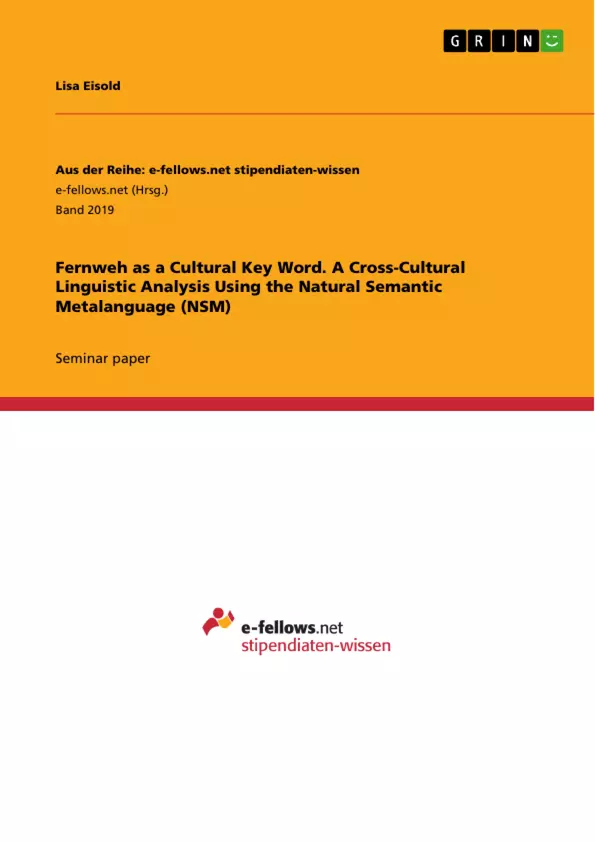"Fernweh" functions as a cultural key word for a whole generation of young Germans travelling the world. This short linguistic analysis examines the meanings and connotations of Fernweh, attempting to make the concept accessible to non-German speakers.
Work and travel, au pair, semester abroad: more and more young Germans leave their home country to spend up to one year abroad. The more remote a destination, the more appealing the trip. This often leaves the older generations speechless. The young people's urge to travel can be best described with the key word "Fernweh", a feeling which lacks an adequate English translation. According to Christiane Kraft Alsop, the English word "wanderlust" that can be found in dictionaries fails to account for the complete scope of the feeling of Fernweh as it emphasises that the longing to travel is only a temporary one. Furthermore, the root "lust" suggests a strongly positive feeling.
"Fernweh", in contrast, not only can be triggered and answered in many different ways but also encompasses a high diversity of things someone might be longing for and a high range of feelings connected to this longing.
Table of Contents
- Fernweh as a Cultural Key Word A Cross-Cultural Linguistic Analysis Using the Natural Semantic Metalanguage (NSM)
- Examples
- References
Objectives and Key Themes
This work examines the concept of "Fernweh," a German word that expresses a deep longing for distant places and cultures, through a cross-cultural linguistic analysis using the Natural Semantic Metalanguage (NSM). The study aims to identify the core components and nuances of Fernweh, highlighting its unique features compared to the English term "wanderlust."
- Causes of Fernweh: Examining the various factors that trigger this longing, including personal experiences, narratives, and dissatisfaction with one's current life.
- Desires Associated with Fernweh: Exploring the diverse desires and aspirations linked to Fernweh, such as seeking new experiences, adventure, independence, or a sense of belonging.
- Emotional Spectrum of Fernweh: Investigating the diverse emotional states associated with Fernweh, encompassing both positive and negative feelings, including melancholy, excitement, and a sense of restlessness.
- Cultural Significance of Fernweh: Analyzing the cultural context and implications of Fernweh, particularly within German culture and its relationship to travel and wanderlust.
- Linguistic Analysis of Fernweh: Applying the NSM framework to dissect the semantic structure and nuances of Fernweh, comparing it to related concepts in other languages.
Chapter Summaries
The first chapter introduces the concept of Fernweh, exploring its cultural significance and distinguishing it from the English term "wanderlust." It examines the various triggers and motivations for Fernweh, encompassing aspects like personal experiences, narratives, and feelings of dissatisfaction with one's current life.
The second chapter delves deeper into the desires and aspirations associated with Fernweh. It investigates the diverse motivations for travel, including the desire for new experiences, adventure, independence, or a sense of belonging, all within the context of Fernweh.
The third chapter investigates the emotional spectrum of Fernweh. It explores the nuanced emotional states associated with this longing, including both positive feelings like excitement and anticipation, as well as negative emotions like melancholy and restlessness.
Keywords
The primary focus of this work revolves around the concept of Fernweh, its linguistic analysis, and its cultural significance. The key themes include cross-cultural linguistic analysis, Natural Semantic Metalanguage (NSM), cultural differences, travel motivation, emotional states, and the distinction between Fernweh and wanderlust. Through a comprehensive exploration of these concepts, the study aims to provide a nuanced understanding of Fernweh and its unique place within the human experience.
Frequently Asked Questions
What does the German word "Fernweh" mean?
"Fernweh" describes a deep longing for distant places and cultures. It is often considered the opposite of homesickness (Heimweh).
Why is "wanderlust" not a perfect translation for "Fernweh"?
While "wanderlust" exists in English, it emphasizes a temporary desire to travel and has a positive connotation ("lust"), whereas "Fernweh" can involve melancholy, restlessness, and a more profound existential longing.
What is the Natural Semantic Metalanguage (NSM)?
NSM is a linguistic framework used in this analysis to dissect the semantic structure and nuances of cultural keywords to make them accessible across different languages.
What triggers the feeling of Fernweh?
Fernweh can be triggered by personal experiences, narratives, travel stories, or a general dissatisfaction with one's current life and surroundings.
Why is "Fernweh" considered a cultural key word for young Germans?
It reflects a generational trend where more young Germans seek long-term stays abroad (work and travel, au pair) to find independence and new experiences in remote destinations.
- Quote paper
- Lisa Eisold (Author), 2015, Fernweh as a Cultural Key Word. A Cross-Cultural Linguistic Analysis Using the Natural Semantic Metalanguage (NSM), Munich, GRIN Verlag, https://www.grin.com/document/336516



